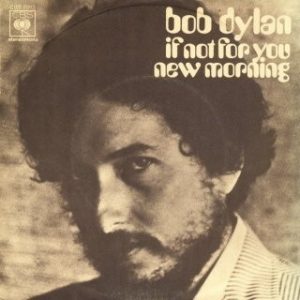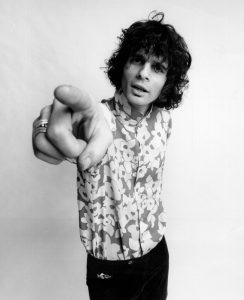by Jochen Markhorst
It’s a peculiar chapter, the New Morning chapter in Dylan’s autobiography, Chronicles Vol. 1. Not so much because of the content, although that is also remarkable and, just like the other four chapters, packaged in a grand writing style, but surprising mostly because of the choice for this album as one of the five main points of the book. It is certainly a nice album, a good album even, and that it was celebrated as a comeback at the time can be traced. The cheers of some reviewers look a bit too ecstatic in retrospect (“superb”, Rolling Stone thinks, for example), but well alright: it does have some beautiful songs.
The wonder remains after reading the chapter. The writer has little appreciation for his own songs, looks back with lukewarm affection and makes clear he already felt that indifference at the time, during the recording:
“I felt like these songs could blow away in cigar smoke, which suited me fine. That my records were still selling surprised even me. (…) I was leaning against the console and listening to one of the playbacks. It sounded okay.”
Dylan explains that lovelessness from his private circumstances. The intrusiveness of the fans who demand the return of the Prince of Protest. The activists who call on him to take his responsibility and to be the voice of a generation again. When awarded the honorary doctorate at Princeton University, Dylan is disgusted as het gets honoured to be as the authentic expression of the disturbed and concerned conscience of Young America. Even Joan Baez sings on the radio that he has to go back to the barricades (Dylan refers to the gruesome, dreary, cheap melodramatic “To Bobby”, but, quite gallantly, abstains from any value judgment), and so on.
Hence, the chronicler claims, he intentionally releases inferior albums. He wants his peace and anonymity back. That claim is in line with earlier statements. Like in ’81, when he is asked about Self Portrait at a press conference in Travemünde, Germany:
“Well that was a joke, that album was put out at a time I didn’t like the attention I was getting. I never did want attention. At that time I was getting the wrong kind of attention for things I hadn’t done. So we released that album to get people off my back, so they would not like me anymore, that’s the reason the album was put out, so people would stop buying my records, and they did. (laughs)”
In this chapter of Chronicles we understand that the same applies to the predecessor Nashville Skyline (1969) and the successor New Morning; all intended to shake off his annoying, stalking disciples. The poet only says it more expressively, more pictorially:
“I released one album (a double one) where I just threw everything I could think of at the wall and whatever stuck, released it, and then went back and scooped up everything that didn’t stick and released that, too.”
The entire episode is embedded around the Archibald MacLeish echec. The elderly, monumental poet laureate has written a letter to Dylan inviting him to write songs for the musical Scratch, his adaptation of the classic The Devil And Daniel Webster. Dylan talks about his uncomfortable encounters with MacLeish and his inability to make the connection with the man he admired and with Scratch. With great difficulty he finally squeezes out “Father Of Night”, (presumably) “Time Passes Slowly” and “New Morning”. All three beautiful songs, but MacLeish seems to be disappointed and Dylan himself does not want to continue the project (“it was so heavy, so full of midnight murder”).
Anyway, when he throws those songs against a wall a few months later, they apparently stick and end up on New Morning.
The MacLeish anecdote is beautifully told and grants a revealing insight into Dylan’s soul stirrings. But it’s all nonsense, as producer Stuart Ostrow explains in his memoirs Present at the Creation, Leaping in the Dark, and Going against the Grain (2005). He obliterates Dylan’s version, calls it delusional even and reveals how it really went. MacLeish has never written a letter to Dylan and finds the idea that Dylan will write the music to Scratch “preposterous”. The producer keeps on pushing the idea, gets after some fruitless encounters with Dylan finally “several songs” from him and arranges a meeting of the Great Poet with the Musician in MacLeish’s home in Massachussetts. That will be a catastrophe. Dylan seems starstruck, doesn’t speak a word, doesn’t ask and doesn’t answer questions, but quickly befriends the house brandy and falls asleep.
Al Kooper, who is present at that one-off meeting (as Dylan’s “musical director”, according to Ostrow), remarkably enough does not tell anything about this memorable visit in his Backstage Passes And Backstabbing Bastards. He accompanies Dylan to an appointment with “some of these people” uptown, but in the taxi home Dylan decides “yanking the songs from the show and making them into a new album.”
Anyway, professor and blogger Edward Cook from Washington has shown that Dylan’s memories of his conversations with MacLeish can be found almost literally in the preface to The Complete Poems Of Carl Sandburg (1970), for which MacLeish wrote the introduction – the thief of thoughts strikes again with one of his compelling paraphrases without citing.
One more fun fact Ostrow does reveal: the song “New Morning” was originally intended as the opening for the musical. That would fit, indeed. The lyrics of the song have – by Dylan standards – a high the-kids-are-alright content. Nothing really happens, actually. Lyrics express the harmony, the peace of an idyll, carelessness and the joy of life.
Very lightly itches the question why the enamoured protagonist wraps his jubilation into denials. “Do you feel the same” is in love, “Don’t you feel the same” is insecure. Is there something wrong? Appropriate, in short, as an introduction to a drama in which dark clouds will soon enter the horizon (Scratch is a Faustian drama, the main character will sell his soul to the devil). The zealous fan with his guitar also notes that the musical setting is different: eleven chords if you play along well, fourteen if you want to squeeze in the extensions very precisely (E11, for example) – in both variants a multiple of an “ordinary” Dylan song, at any rate. It does not sound forced though; “New Morning” is a nicely flowing song.
Intended producer Bob Johnston has to drop out after a few sessions, after which Al Kooper jumps into the gap. Kooper has been quite busy with the album, but tells remarkably little about it in his book (less than a page). And that has a lot to do with the almost traumatic progress of his collaboration with Dylan in these days. Never again, a frustrated Kooper sighs, who eventually walks away when a fickle, indecisive Dylan for days and days shuffles back and forth the definitive song choice and sequence for the album.
Relatively commentless, he then hints at the frustration that he spent days chasing wild geese for arrangements, strings and wind instruments. Never released, he notes dryly (in brackets). Dylan hardly ever cooperates constructively with Kooper’s – often beautiful – ideas and rejects most of the embellishments. To the outside, however, in those days Kooper conceals his discord. In the Rolling Stone of October 15, 1970, four days before the release date, he declares very loyally that it is the best album Dylan has ever made. And that it will embarrass all those people who had already written him off.
Part 10 of The Bootleg Series, Another Self Portrait features ten of those alternative and rejected takes and Kooper’s frustration becomes completely clear. On hearing the alternative “New Morning”, for instance.
“With horn overdubs” it says, but in addition it is also a different mix, Kooper can be heard re-playing (parts of) his organ part, pieces of David Bromberg’s guitar are cut away, but most of all: a fantastic, rich brass section placed next to, in front of and over his own french horn. We already know the accents after the beat from his work at Blood, Sweat and Tears (strangely enough the wind instruments do not get credits, but it’s very likely we hear the men from BS&T), as well as the unorthodox bass trombone playing a tuba-like party. Dave Bargeron, presumably, who joined the band in ’70. Kooper’s own horn is the only melancholic nuance in the arrangement, and also the only horn who survives the final version, but colours much deeper, more melancholic among the other brass instruments than in the poorer album version.
All in all, it is a glorious version that manages to pimp up the already beautiful original.
Still, the song remains a lonely shining gem. Curiously enough, it is hardly ever picked up by colleagues, but that one noteworthy cover is very successful. The Grease Band, the old backing band of Joe Cocker, plays a beautiful, cheerfully pumping rock version of “New Morning” on the second album Amazing Grease in ’75,
As the opening track, as it should be.
What else is on the site
You’ll find an index to our latest posts arranged by themes and subjects on the home page. You can also see details of our main sections on this site at the top of this page under the picture.
The index to the 500+ Dylan compositions reviewed is now on a new page of its own. You will find it here. It contains reviews of every Dylan composition that we can find a recording of – if you know of anything we have missed please do write in.
We also have a discussion group “Untold Dylan” on Facebook. Just type the phrase “Untold Dylan” in, on your Facebook page or follow this link
And please do note The Bob Dylan Project, which lists every Dylan song in alphabetical order, and has links to licensed recordings and performances by Dylan and by other artists, is starting to link back to our reviews.



We are actively promoting a link to this interesting topic on The Bob Dylan Project at:
https://thebobdylanproject.com/Song/id/444/New-Morning
If you are interested, we are a portal to all the great information related to this topic.
Join us inside Bob Dylan Music Box.